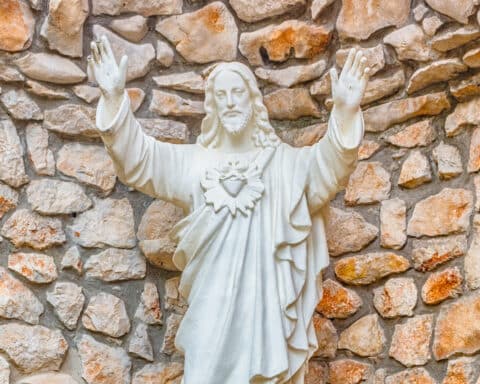Fear of the Lord. This is a phrase particular to Scripture. It does not mean to literally be afraid of the Lord, but to have awe or reverence for God. Part of having proper reverence for God is the ability to recognize God as God. Once we know God, we come to know ourselves more truly. St. Augustine simply put it this way: Know God, and know thyself. The readings for this Sunday from Matthew’s Gospel turn on this proper understanding of fear, and thus of knowing God and ourselves.
The Gospel reading opens with these words, “Fear no one.” These words are not a direct reference to “fear of the Lord.” We know this because Christ then goes on to elaborate, “And do not be afraid of those who kill the body but cannot kill the soul.” Thus, the Gospel here speaks about literally being afraid, even as we might be afraid of death.
| June 25 – 12th Sunday in Ordinary Time |
|---|
|
Jer 20:10-13 Ps 69:8-10, 14, 17, 33-35 Rom 5:12-15 Mt 10:26-33 |
But Matthew’s Gospel is also drawing a careful distinction here that helps us to understand God, and ourselves in contrast. We, it says, cannot “kill the soul.” Yes, we can do great harm to one another, and we can even “kill the body,” but we do not have the power to kill another’s soul. In essence, the passage is reminding us that we are not the Lord of life. Only God is. And while we may suffer in this life, nothing can “kill” us in our innermost being, not even death. Yes, that is how significant the difference is between you, me and our God. He is our very life, in the most fundamental and essential way.
Do not be afraid
And so the Gospel reading goes on, “[Rather], be afraid of the one who can destroy both soul and body.” Here, it seems, the Gospel is referring to God. But is Matthew calling us to be afraid of God, or to have awe and reverence for God’s holiness?
Well, it could be a bit of both, at least initially. From St. Augustine (d. 430) onward, many figures from the Christian tradition have thought about this. Typically, they tell us that one begins by being afraid of God in a more literal way. As we come to understand that God alone is the Lord of life, we come to understand that we are not. Coming to know ourselves through such a contrast to God, sheds light on that thing that “kills” us: sin, and separation from life itself.
This should very well make us afraid. But this moment of understanding ourselves is also a moment of understanding God, one that instills awe and reverence for God and moves us back toward him. The contrast between God and our sinful selves, suggests an understanding of just “how low” God has “bent” in order to be with us and to bring us life. We now see the great humility of God’s mercy, and are struck with a more “perfect” fear, an awe and reverence for God, rooted in thanksgiving and love. We know God, and ourselves better.
Let us now turn to one last passage from this Sunday’s Gospel. As we turn, we should remember that Matthew once worked as a tax collector. This fact makes this passage more striking in its beauty. We not only hear Christ’s words as recorded for us, but we also hear them spoken as to Matthew in particular. And thus, we are offered Matthew’s understanding of himself and of God as revealed by God’s merciful activity on our behalf in Christ.
May these words from Matthew 10:29-31 help us to know God and ourselves, and move us to awesome thanksgiving: “Are not two sparrows sold for a small coin? Yet not one of them falls to the ground without your Father’s knowledge. Even all the hairs of your head are counted. So do not be afraid; you are worth more than many sparrows.”





